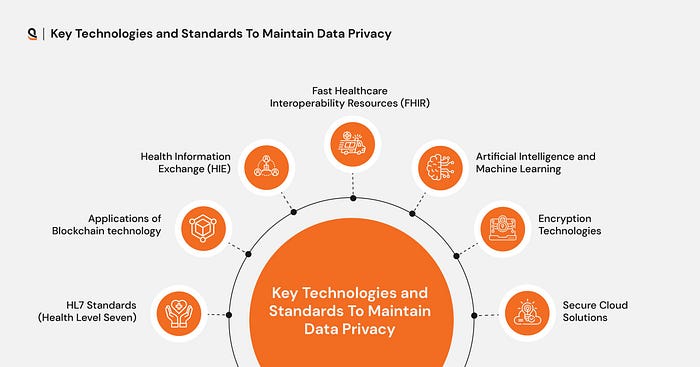Protect Your Data Like a Pro: 7 Key Privacy Technologies and Standards
In the evolving digital healthcare landscape, safeguarding sensitive patient data is critical for healthcare organizations. Advanced technologies and standards ensure data privacy, security, and compliance. Here are seven key privacy technologies and standards to prioritize for robust healthcare data protection.

1. HL7 Standards (Health Level Seven)
HL7 provides international standards for securely exchanging electronic health information, ensuring interoperability between healthcare systems.
It standardizes how sensitive patient information is structured and shared to enhance data integrity and reduce vulnerabilities.
The Clinical Document Architecture (CDA) enables secure and accurate clinical documentation sharing among providers.
Are you aware of the significant benefits of digitizing healthcare systems? Discover how these advancements transform care delivery while ensuring robust data protection. Explore more.
2. Applications of Blockchain Technology
Blockchain technology serves as a decentralized ledger for secure healthcare transactions, offering:
Cryptographic hashing for encrypting patient records.
Direct data access management by patients through blockchain-based permissions.
Unified data-sharing platforms to enhance interoperability among providers.
Blockchain reduces the risks of unauthorized access, tampering, or data loss by decentralizing data management.
3. Health Information Exchange (HIE)
HIE supports the electronic exchange of health information among organizations, ensuring data availability while limiting access to authorized personnel.
Strong encryption and authentication protocols safeguard information during transfer and storage.
Auditable trails of data access and sharing enhance compliance with privacy regulations.
4. Fast Healthcare Interoperability Resources (FHIR)
FHIR, an HL7 standard, enables seamless healthcare information exchange between systems.
Interoperability: APIs facilitate communication between diverse systems.
Enhanced Security: Protocols like OAuth2 ensure secure data sharing.
Patient Control: Patients can access and manage their health data independently.
How does healthcare tackle evolving data privacy challenges? Learn about the hurdles faced by organizations and the technologies addressing them. Find out here.
5. Artificial Intelligence and Machine Learning (AI/ML)
AI and ML enhance data protection in several ways:
Identifying unusual patterns or anomalies in data access to prevent breaches.
Predicting vulnerabilities to mitigate risks before they occur.
Automatically anonymizing personal data in research datasets.
These technologies streamline threat detection and prevention, fortifying data privacy.
6. Encryption Technologies
Encryption ensures sensitive data remains secure by converting it into unreadable formats accessible only with decryption keys.
Advanced Encryption Standard (AES): Protects stored and transmitted data.
Public Key Infrastructure (PKI): Secures communication between healthcare providers.
Homomorphic Encryption: Enables computations on encrypted data without decryption.
Encryption plays a crucial role in compliance with regulations like HIPAA and in protecting patient information during storage and transmission.
7. Secure Cloud Solutions
Cloud platforms provide scalable, secure environments for storing and processing healthcare data. Features include:
End-to-End Encryption: Protects data in transit and at rest.
Access Control Mechanisms: Ensures only authorized personnel access data.
Privacy-Preserving Technologies: Utilizes techniques like differential privacy for data analysis without compromising confidentiality.
Leading providers such as AWS, Google Cloud, and Microsoft Azure offer healthcare-specific solutions with compliance certifications like HIPAA and GDPR.
Looking for strategies to secure healthcare data? Discover effective solutions to maintain privacy in the digital healthcare ecosystem. Learn more.